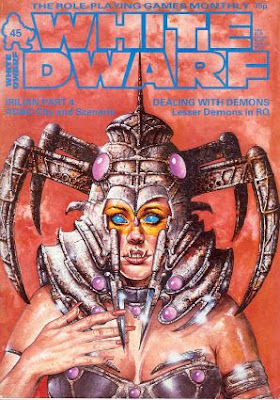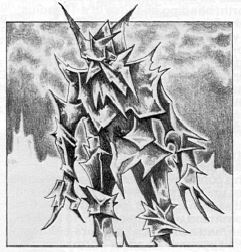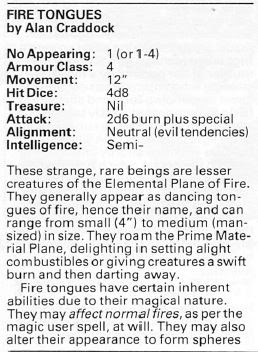What’s
this? No Phil Masters? You okay Phil?
However,
it does give somebody else a chance, in this case two “somebodies”, Alan
Craddock and Jason Micklewright, who give us a collection of elemental
creatures in a Fiend Factory subtitled Plane
Speaking.
The
first of three entries from Alan
Craddock is the Sand Demon, aka Dust Scurry. Now, I could have sworn
that there was an officially published creature called a “dust devil”, but I’ve checked both the Fiend Folio and Monster
Manual II, without success. The index in the MM2 lists creatures by pseudonyms
as well, so even if the monster was under a different name, it would still be
there, but it’s not. No, now I come to think of it, it was a spell, possibly in
Unearthed Arcana. And, I finally tracked it down. A second level cleric spell
in the old 1st Edition Unearthed Arcana. Phew, I thought for a
moment I was going mad!
Be
that as it may, that’s essentially what a sand demon is – a creature from the
para-elemental plane of Dust that can assume the form of a whirlwind of
stinging, blinding sand. They can also create mirages, cast gust of wind and heat metal, and assume the semi-humanoid form seen in the picture.
They also come with a list of effects that result when specific spells are cast
at them, which is quite a 1E thing to do.
The Servants of the Flame, aka Fire Monkeys, also by Alan, are, pretty much, fire monkeys, servitor creatures thought to be created by Imix, Elemental Prince of Evil Fire.
Fire
Monkeys are always going to be fun, but in the end these are basically monkeys
with added fire damage, although some can also cast burning hands. I think
mechanically you could just use magmin, but describe them as monkey-like.
Jason
Micklewight gives four creatures for the price of one, with Para-Elementals of Ice, Heat, Vapour and
Dust. They’re all pretty straightforward, as elementals tend to be, each
delivering a damaging attack of the appropriate type, and most with some kind
of additional effect. The dust elemental blinds and can choke characters
trapped in it, the ice elemental can break off a shard in its target that
continues to cause damage, and the vapour elemental cooks people in their
armour. Only the heat elemental gets no extra effect – I’d give it powers of
exhaustion, perhaps.
While
I don’t think the artwork is the best (although better than a lot of Alan
Hunter), I do like the humorous elements, like the guy using the heat elemental
to make toast. My Monster of the Week gets a suitably jokey illustration as it
attacks a waiter from an Arabian Nights themed restaurant, because these
creatures are described as enjoying a good pyromaniac prank.
Yes, it’s Alan Craddock’s third entry, the Fire Tongues. (NB it’s really easy to keep referring to these as Flame Tongues, but that’s the sword).
Most of the abilities of these are
easily adapted from both fire elementals and magmin. I translated “detect
invisible creatures 75% of the time” to simply giving them blindsight (which
can function as it is described in the fire tongue entry). Because they are
small, they have d6 for hit dice – I took the average of the original 4d8 hit
dice (18), and then worked out how many d6s would give the same result. Thus 4d8
original hit dice become 5d6 hit dice in 5th Edition. You’ll also
need Xanathar’s Book of Everything for the control
flame cantrip, the nearest alternative for affect normal fires.
|
Fire-Tongue |
||||||||||||
|
Small elemental, neutral |
||||||||||||
|
Armour Class 15 Hit Points 17 (6d6) Speed 30 ft., fly 30 ft. |
||||||||||||
|
||||||||||||
|
Proficiency Bonus +2 Damage Vulnerabilities cold Damage Immunities fire Senses blindsight 60 ft. (blind beyond this
distance), passive Perception 10 |
||||||||||||
|
Languages – |
||||||||||||
|
Challenge 1/2
(100 XP) |
||||||||||||
|
Death Throes.
When the fire-tongue is reduced to 0 hit points it explodes in a fireball,
causing 10 (3d6) fire damage to all creatures within a 10-foot radius. A
successful DC 10 saving throw halves this damage. Fiery Body. A creature that touches the fire-tongue or hits it with a melee attack while within 5 feet of it takes 7 (2d6) fire damage. ACTIONS |
||||||||||||
|
Burning Touch. Melee Weapon Attack:
+3 to hit, reach 5 ft., one target. Hit:
7 (2d6) fire damage, and the creature struck must make a DC 10 Dexterity
saving throw or catch on fire. A burning creature takes 3 (1d6) fire damage
at the end of the flame-tongue’s turn, unless it spends an action to
extinguish itself. Control Flames.
The fire-tongue can control flames
as per the cantrip. |












Comments
Post a Comment